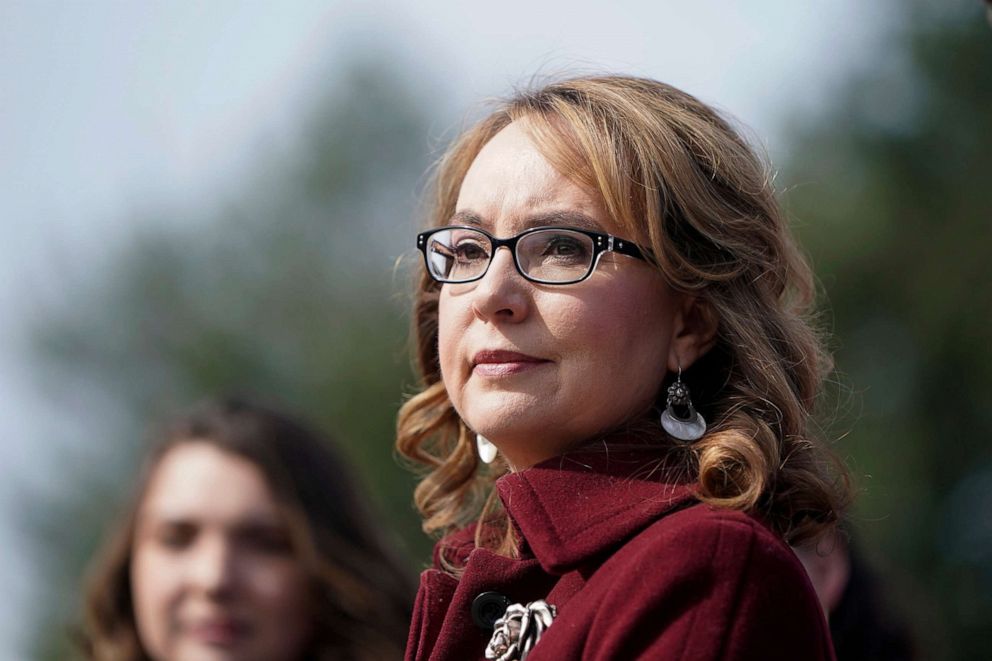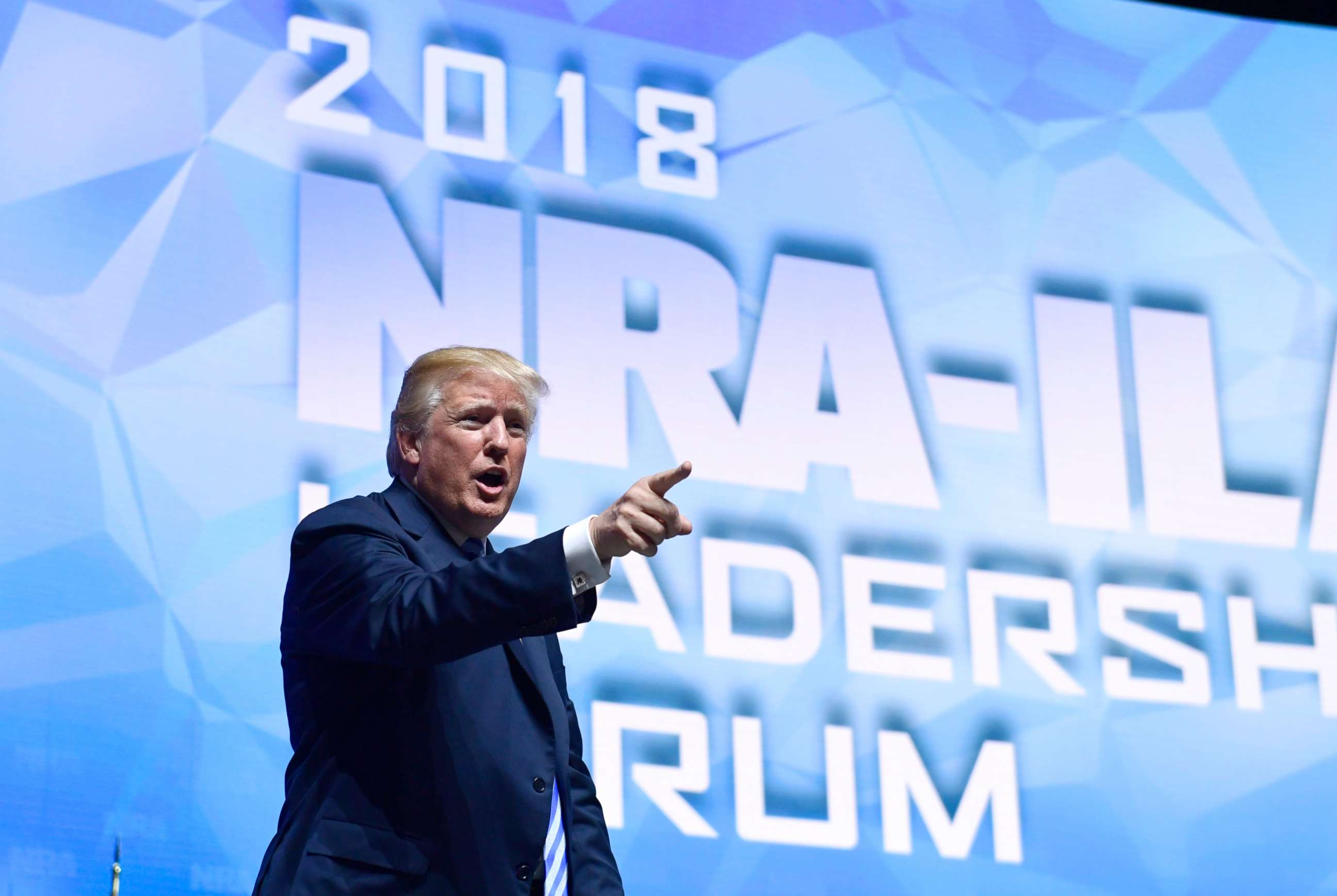Watchdog groups sue federal agency over NRA's alleged campaign coordination 'scheme'
The complaint alleges the FEC has failed to enforce campaign finance law.
A pair of legal groups sued the Federal Election Commission on Wednesday, seeking to compel the agency to enforce the law amid what they allege is mounting evidence that the National Rifle Association has engaged in “an elaborate scheme … to unlawfully coordinate with candidates it supports for federal office,” including with the 2016 presidential campaign of Donald Trump.
The Campaign Legal Center, a nonpartisan campaign finance watchdog, filed the lawsuit on behalf of the Giffords Law Center, a gun-control advocacy group led by former Democratic lawmaker from Arizona Gabby Giffords. The lawsuit accuses the NRA of “using a network of shell corporations” to circumvent contribution limits and coordinate approximately $35 million in advertisement spending with the campaigns of at least seven Republican candidates over the last three election cycles, “thereby making millions of dollars of illegal, unreported, and excessive in-kind contributions.”
But while the NRA deliberately circumvented FEC rules that prohibit vendor coordination between campaigns and outside groups, the complaint alleges, the federal agency responsible for oversight of election spending – whose members frequently deadlock on matters along partisan lines -- has not taken any enforcement action.
“The FEC is supposed to be the nation’s election watchdog, but in this case, it didn’t bite, bark, or even whimper,” said Adam Skaggs, chief counsel for the Giffords Law Center, in statement. “Instead, it turned a blind eye … In a desperate attempt to hold onto power and influence, NRA executives have flagrantly ignored our campaign finance laws and undermined the integrity of our election system. The FEC must bring illegal campaign conduct into the light of day.”
A spokesperson for the FEC declined to comment on the litigation.

Federal Election Commission rules prohibit super PACs from making coordinated expenditures with campaigns, meaning that the Trump campaign should not be "materially involved" in the production and placement of ads purchased by the super PAC arm of the NRA, and vendors shared by the NRA and the Trump campaign cannot share information in support of each other.
But as first reported by the nonprofit journalism outlet The Trace in December, throughout the 2016 election cycle, the NRA launched an aggressive $25 million pro-Trump ad blitz using multiple vendors linked to a political consulting firm called OnMessage, while the Trump campaign placed its ads using multiple vendors linked to a firm called National Media. The two firms were disguised as separate entities, according to the complaint, which cites public records reviewed by ABC News, but in fact vendors were "functionally indistinguishable.”
"[T]hey are led by the same people and located at the same address,” the complaint said, “and no internal separation or firewall exists between the staff who work for each entity.”
A spokesperson for the NRA did not respond to ABC News’ requests for comment, while a spokesperson for the Trump campaign declined to comment. Sen. Sheldeon Whitehouse, D-R.I., and Rep. Jamie Raskin, D-Md., opened a probe into this matter earlier this year, demanding documents from the NRA, the Trump campaign and the relevant vendors. A spokesperson for Sen. Whitehouse told ABC News last week that none of them have responded to those requests, either.
According to Trevor Potter, who cofounded the Campaign Legal Center after serving as commissioner and chairman of the FEC, the alleged coordination provided those candidates with a “significant” advantage.
“If they know what you’re going to do and when you’re going to do it, that spending is much more valuable to candidates,” Potter told ABC News. “They can build their plans around your spending. They can match messages. They don’t have to spend where you’re spending. It’s as if the candidates had that much more money in their pockets during their races.”

Critics of the FEC have described the agency as one crippled by partisanship. The commission was designed to consist of six members – no more than three from each party – and four of them must agree to launch an investigation, a system that prioritized compromise. But the commission is currently comprised of only four members – two Republicans, one Democrat, one Independent -- and the executive branch has not appointed new commissioners, so the agency frequently deadlocks on issues and, critics say, has been slow to launch investigations.
According to Ann Ravel, a Democratic former commissioner who left the agency in February of 2017, the FEC has been failing to enforce campaign finance laws for several years.
“The F.E.C. was betraying the American public and jeopardizing our democracy,” she wrote in an op-ed for The New York Times. “It pains me to report that the agency remains dysfunctional, more so than ever, as I prepare to depart at the end of this month as my term nears its end. This is deeply worrisome, because the F.E.C.’s mission is to ensure fairness in elections.”
Others, like campaign finance lawyer Caleb Burns of the Washington, D.C. law firm Wiley Rein, see the partisan divide as a crucial safeguard "to avoid political abuse by one party of the other" when regulating "political activity that is highly protected by the First Amendment’s freedoms of speech and association."
In addition to the Trump campaign, the complaint alleges that the NRA has shown a years-long pattern of coordinating with several other congressional campaigns in a similar operation since at least 2014, including the campaigns of Sens. Thom Tillis, R-N.C., Tom Cotton, R-Ark., Cory Gardner, R-Colo., Ron Johnson, R-Wis., and Josh Hawley, R-Mo., and Matt Rosendale, who ran unsuccessfully against Democratic Sen. Jon Tester of Montana in 2018.
Spokespersons for Sens. Tillis, Cotton and Gardner did not immediately respond to ABC News’ requests for comment. Messages left at the offices of Sens. Johnson and Hawley, as well as Mr. Rosendale, now the Commissioner of Securities and Insurance in the Office of the Montana State Auditor, were not immediately returned.
And with the 2020 election cycle already underway, the continued deadlock at the FEC has watchdogs worried that the election system is still ripe for exploitation.
“As long as the commission has not ruled on this behavior, there’s a risk that it will be happening or is happening now,” Potter told ABC News. “The country has a deadline. The legal system should have one, too.”
ABC News’ Katherine Faulders contributed to this report.




